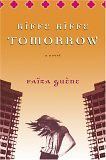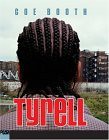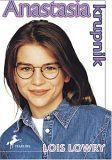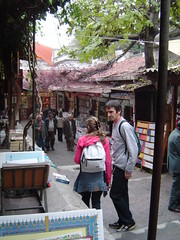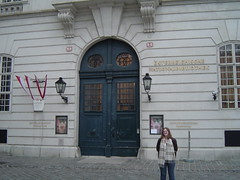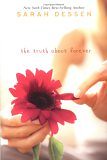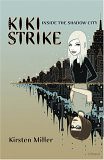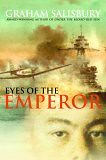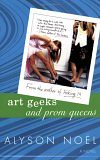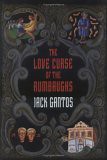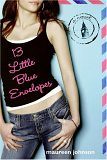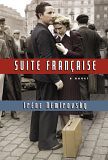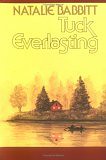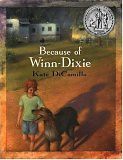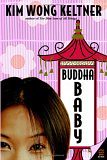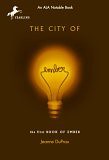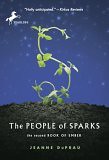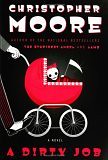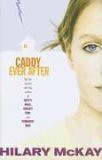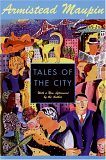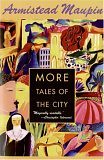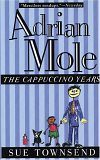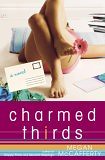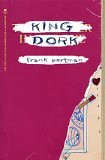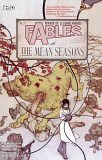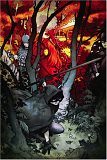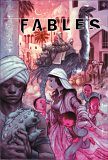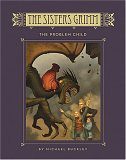Kirsten Miller (aka the author of the most awesome Kiki Strike commented yesterday, but left no way to get in touch... so Kirsten, if you're reading this, I'm an adult medium. I'm also going to see if I can email you via Bloomsbury.
I'm trying to catch up on reviews. I'm seriously about 85 books behind. One of my new year's resolutions last year was "Be a Better Blogger". I think I was but this next year, it's going to be "Review at least 5 books a week or stay current with reading". So y'all have that to look forward to. Marie's been complaining about my lack of reviews and therefore her lack of new books to look for.
So... here are two tales of ghetto life, one of which is awesome, and one of which is not so much.
I read Kiffe Kiffe Tomorrowby Faiza Guene based on this post at Lotus Reads. In this deceptively easy read, Doria is a French teenager of Moroccan descent living in Paradise Gardens-- a Parisian suburban ghetto. Sick of school, sick of the stream of social workers coming to the house, sick of her gossip-y neighbors, Doria's main outlook on life is "kif kif tomorrow" which she translates as "same old shit tomorrow". The chapters are short, the style is as if a 15-year-old girl were just talking at you and it works really well. If you don't want to , you won't notice the stark and dismal portrait of life for Arab immigrants to France. But this is still a great book, not only for the protrayal of Parisian ghetto life, but also because it's a remarkable story of Doria's coming-of-age and can be enjoyed on many levels. I highly recommend.
Tyrell, by Coe Booth, doesn't work nearly as well. This is also written in the voice of a teenager living in the projects of the Bronx. Except that his mom gets evicted and they (along with his younger brother) need to navigate the city's homeless system. Tyrell's dream is to get back into the projects. Booth grew up and lives in the Bronx and was a social worker there for a long time. I don't doubt the book's voice, or the authenticity of the story. What rankles me is the over reliance on stereotypes, the flatness of many of the characters, and a distrubingly misogynistic tone. There was not 1 decent woman in the whole book. Not 1!
Tomorrow, I leave for Christmas down Texas way. I'm already thinking about what books to bring. I plan on catching up on lots of reading. Lots of books!
Wednesday, December 20, 2006
Tuesday, December 19, 2006
Books I Missed the First Time Around
Man, am I ever behind in my blogging duties. I was going to put together my Best of 2006 list, but I haven't talked about half the books on the list yet. Ah well.
None of these will be on the list, but it's what I feel like talking about right now.
Anyway... so this summer I finally read Anastasia Krupnik by Lois Lowry and The Agony of Alice by Phyllis Reynolds Naylor. Both are the first books in extremely popular series that I never read when I was the target audience, but wish I had. Interestingly enough, I liked Alice a lot more than Anastasia, but when I was a kid, it would have been the other way around.
Quick summaries:
Anastasia hates her name, her fourth grade teacher, liver, and pumpkin pie. She loves making lists, writing poetry, her wart, and her goldfish. When her parents announce she's going to have a little brother, she adds her parents and babies to the list of things she hates. Over the school year, both lists change as items are added and deleted in this funny and moving book.
Alice is about to start sixth grade at a new school in Silver Spring. ALl she really wants is to be on safety patrol, but they were all chosen the year before. Instead of being placed in Miss Cole's class (who will sometimes drive you home in her sports car) or Mr. Weber's class (who takes everyone on a camping trip in the spring), she has Mrs. Plotkin, who is boring and old. If she only had a mother, Alice would have help navigating her transition into being a teenager, but, left on her own, is she really just going backwards and not growing up at all?
I also read Starting with Alice, which is the first of 3 prequels to the Alice series.
Both Alice and Anastasia are accurate and touching portrayals of the 10-13 years, which are not fun. I think I liked Alice better now because Naylor picks up on a lot of the mishaps that I can now look back on and laugh about. Lowry picks up on those feelings that still hurt.
Also, remember that show on PBS that you got to watch in reading class where this woman would read a story or a chapter while the guy drew illustrations? Once, she read this story about a girl whose brother takes her jeans shopping and she walks in on a guy in blue underwear in the dressing rooms. I always wanted to know what the story is and wanted to read it. I remembered it the first time I ever fell into the Gap. I was very excited when I was reading The Agony of Alice and THERE IT WAS! And then I was very annoyed because she was buying Levis. At the Gap. The Gap only sells Gap brand!
None of these will be on the list, but it's what I feel like talking about right now.
Anyway... so this summer I finally read Anastasia Krupnik by Lois Lowry and The Agony of Alice by Phyllis Reynolds Naylor. Both are the first books in extremely popular series that I never read when I was the target audience, but wish I had. Interestingly enough, I liked Alice a lot more than Anastasia, but when I was a kid, it would have been the other way around.
Quick summaries:
Anastasia hates her name, her fourth grade teacher, liver, and pumpkin pie. She loves making lists, writing poetry, her wart, and her goldfish. When her parents announce she's going to have a little brother, she adds her parents and babies to the list of things she hates. Over the school year, both lists change as items are added and deleted in this funny and moving book.
Alice is about to start sixth grade at a new school in Silver Spring. ALl she really wants is to be on safety patrol, but they were all chosen the year before. Instead of being placed in Miss Cole's class (who will sometimes drive you home in her sports car) or Mr. Weber's class (who takes everyone on a camping trip in the spring), she has Mrs. Plotkin, who is boring and old. If she only had a mother, Alice would have help navigating her transition into being a teenager, but, left on her own, is she really just going backwards and not growing up at all?
I also read Starting with Alice, which is the first of 3 prequels to the Alice series.
Both Alice and Anastasia are accurate and touching portrayals of the 10-13 years, which are not fun. I think I liked Alice better now because Naylor picks up on a lot of the mishaps that I can now look back on and laugh about. Lowry picks up on those feelings that still hurt.
Also, remember that show on PBS that you got to watch in reading class where this woman would read a story or a chapter while the guy drew illustrations? Once, she read this story about a girl whose brother takes her jeans shopping and she walks in on a guy in blue underwear in the dressing rooms. I always wanted to know what the story is and wanted to read it. I remembered it the first time I ever fell into the Gap. I was very excited when I was reading The Agony of Alice and THERE IT WAS! And then I was very annoyed because she was buying Levis. At the Gap. The Gap only sells Gap brand!
Labels:
Alice,
Anastasia Krupnik,
banned,
Fiction,
Juvenile,
Lois Lowry,
Phyllis Reynolds Naylor
Tuesday, November 28, 2006
I'm Back!
Didja miss me? I'm jetlagged and have a ton of stuff to do for school in the next few weeks, so I might be hit or miss... but here's some book related vacay pics.
The Book Bazaar in Istanbul (located by the Grand Bazaar). Lots of art, lots of books. Cooler if you read Turkish.
The Austrian National Library in part of the expansive Hofburg Palace. (Talk about Shock and Awe!)
The Book Bazaar in Istanbul (located by the Grand Bazaar). Lots of art, lots of books. Cooler if you read Turkish.
The Austrian National Library in part of the expansive Hofburg Palace. (Talk about Shock and Awe!)
Monday, November 20, 2006
Vacay!
Pooh. After Alyson Noel commented here, on my own little blog, the day after I reviewed her Art Geeks and Prom Queens, I've had a slightly over infated sense of self. And as such, I was really hoping that Bloomsbury read my plea for an "I am Kiki Strike" T-Shirt and they would have contacted me by now. *sigh*
In other, better news, tomorrow night I am leaving and am spending the next week in fantabulous (at least, I hope it will be) Istanbul (not Constantinople). (Yes, we are spending Turkey day IN TURKEY. HA!) I have been saving all 1024 pages of Jonathan Strange & Mr Norrell for this trip, but I'm starting to think that will all that airplane time, it will not be enough. So... what else to take? Do I take the reading I have to do, knowing I will burn through it? Or take some of the big, thick inviting tomes that have been waiting patiently for me, such as Big Breasts & Wide Hips? How much suitcase room can I devote to books anyway? Who needs underwear? I'm well read.
Last night I finishedThe Truth about Forever and it was perfectly fine. To put it in Macy's words, it was fine. Just fine.
And becaue of that, it was so dissapointing because the whole time it was perched on the edge of earth-shattering greatness... and it just never got there.
Macy's dad died a year and a half ago and she and her mother have never fully grieved. Her perfect boyfriend is spending the summer at Brain Camp and dumps her over email. (Wait, they're on a break.) Her co-workers at the library and bitchy and hate her. Then she starts hanging out with the Wish Catering crew and working for them after work and everything starts to change...
Well written, it stayed safe and predictable and it was really good, but so close to being so much better and just lacking that je ne said quoi that in the end, I can muster now more than a "meh".
In other, better news, tomorrow night I am leaving and am spending the next week in fantabulous (at least, I hope it will be) Istanbul (not Constantinople). (Yes, we are spending Turkey day IN TURKEY. HA!) I have been saving all 1024 pages of Jonathan Strange & Mr Norrell for this trip, but I'm starting to think that will all that airplane time, it will not be enough. So... what else to take? Do I take the reading I have to do, knowing I will burn through it? Or take some of the big, thick inviting tomes that have been waiting patiently for me, such as Big Breasts & Wide Hips? How much suitcase room can I devote to books anyway? Who needs underwear? I'm well read.
Last night I finishedThe Truth about Forever and it was perfectly fine. To put it in Macy's words, it was fine. Just fine.
And becaue of that, it was so dissapointing because the whole time it was perched on the edge of earth-shattering greatness... and it just never got there.
Macy's dad died a year and a half ago and she and her mother have never fully grieved. Her perfect boyfriend is spending the summer at Brain Camp and dumps her over email. (Wait, they're on a break.) Her co-workers at the library and bitchy and hate her. Then she starts hanging out with the Wish Catering crew and working for them after work and everything starts to change...
Well written, it stayed safe and predictable and it was really good, but so close to being so much better and just lacking that je ne said quoi that in the end, I can muster now more than a "meh".
Saturday, November 18, 2006
Girl Superspy
Kiki Strike Inside the Shadow City by Kirsten Miller
It's a little difficult to fully explain this book, but basically...
Take a group of renegade girlscouts dressed as ninjas, an exiled Eastern European princess, some opium dens and theives liars, a horde of old, an entire city located underneath New York City's subways, and millions of murderous rats. Holding it all together is the very mysterious, and possibly dangerous, Kiki Strike. But who is this Kiki Strike? Is she a Defender of the Innocent? Or an International Assassin? Or possibly a Kung-Fu movie star?
This is an exciting and, well, just plain awesome adventure that features a group of girls kicking ass and taking names. Most wonderful. My favorite is the end of each chapter, which offers helpful hints on such things as how to best follow someone, how to lie, how to spot a fake diamond, how to disguise yourself and how to escape from kidnappers. I can't tell if this is going to be a series or not, but I certainly hope so.
Also, I need an "I am Kiki Strike" t-shirt. I know that Bloomsbury gave a few out, and if anyone's reading this, I WANT ONE!
Be sure to check out the website as well! There's a quiz to decide which irregular you are AND you can download a buddy icon. (Even though I'm a Ananka, Oona was my favorite and she just replaced Colin Firth as my buddy icon. If you don't know me, replacing Colin Firth is REALLY BIG DEAL.) Also, Ananka's blog with her continuing adventures is great. I want to go to Paris now!
It's a little difficult to fully explain this book, but basically...
Take a group of renegade girlscouts dressed as ninjas, an exiled Eastern European princess, some opium dens and theives liars, a horde of old, an entire city located underneath New York City's subways, and millions of murderous rats. Holding it all together is the very mysterious, and possibly dangerous, Kiki Strike. But who is this Kiki Strike? Is she a Defender of the Innocent? Or an International Assassin? Or possibly a Kung-Fu movie star?
This is an exciting and, well, just plain awesome adventure that features a group of girls kicking ass and taking names. Most wonderful. My favorite is the end of each chapter, which offers helpful hints on such things as how to best follow someone, how to lie, how to spot a fake diamond, how to disguise yourself and how to escape from kidnappers. I can't tell if this is going to be a series or not, but I certainly hope so.
Also, I need an "I am Kiki Strike" t-shirt. I know that Bloomsbury gave a few out, and if anyone's reading this, I WANT ONE!
Be sure to check out the website as well! There's a quiz to decide which irregular you are AND you can download a buddy icon. (Even though I'm a Ananka, Oona was my favorite and she just replaced Colin Firth as my buddy icon. If you don't know me, replacing Colin Firth is REALLY BIG DEAL.) Also, Ananka's blog with her continuing adventures is great. I want to go to Paris now!
Tuesday, November 14, 2006
War is Hell
FYI, Flickr and Blogger aren't playing nice at the moment, so book covers should come later...
Before I get to the reviews, FYI, the new Georgia Nicholson book, Love Is a Many Trousered Thing, is slated to come out in May and available for pre-order now on Amazon. Woot!
Also, dear, dear Amazon. I have told you how much I am in lurve with Jasper Fforde , why then, did you fail to tell me back in August that he had a NEW Nursery Crime book out, The Fourth Bear: A Nursery Crime. I depend on you for such details!!!! And I didn't know! And I feel sad. Well, I was sad that you had betrayed my heart in such a way, but then I got a copy at the library (which was easy to do, given that, you know, I work there.)
Anyway, y'all don't want to hear me, you just want to dance.
First off, this August, my plan was to read Barbara Tuchmann's Pulitzer Prize winning book, The Guns of August, about the first month of WWI. Well, I started it in August but with all the other reading I've had to do for work and school, I didn't get to actually finish it until Saturday. Given that Saturday was Armistice Day, I find it appropriate. This book has been critically acclaimed a million times and I don't have much to add. It was well worth the read and an immensely fascinating look at how paranoid the Kaiser seemed and how steadfastly those in charge committed to a plan and refused to be swayed, despite the consequences.
Interestingly enough, when outlining the causes of war, the assasination of Archduke Ferdinand barely garned a sentence. To be fair, when outlining the scope of the book, Tuchmann states that she wasn't going to touch the Balkan question, as to address it fairly would be a whole book in and of itself.
This book was obviously written in a time when the average reader had a more extensive knowledge of European History. Now, I'm fairly well trained in history, but I've only had two college classes in European history (one was focused soley on England and the other was just general Europe) and I was constantly looking things up. (For instance, there were all these references to animousity between France and Germany in 1870, but never gave it a name, which made it hard to look up. It was the Franco-Prussian war. Luckily, I live with a British History scholar, and he knows a lot more about general European stuff than I do.) Also, the maps are very focused and it can be hard to see where the area of detail was in the greater European context. (At point I was looking at a map of airport routes in my inflight magazine trying to figure out what bit of German coast I was looking at.)
That said, this book is the perfect reason to buy yourself an Historical World Atlas.
Also, Tuchmann is very funny. She often slips in dry little comments, such as this one from p. 267
German soldiers, posted as informers, were found dressed as peasants, even peasant women. The latter were discovered, presumably in the course of non-military action, by their government-issued underwear.
But for now, let's talk about some YA war books, shall we?
By far, the hands-down best YA war book I've read recently is Kipling's Choice by Geert Spillebeen. A fiction account of John Kipling's (Rudyard Kipling's son) last moments, it tells the story of a young man desperate for the glory and honor of war.
Rudyard had always wanted to serve in his Majesty's service and was denied entry due to his poor eyesight. His hopes and dreams trasnfered to his only son, John. His grades weren't good enough to go to the best naval academies, but his gets into an acceptable army school. But John has his father's eyes and the lifestyle befitting the priviledged sons of Britian's elite...
When war breaks out in Europe in 1914, Rudyard Kiplin is one of the loudest voices calling for British involvement. WHen England joins, he leads the recruitment calls. It breaks his and his son's hearts that John cannot be in the first wave, especially as his friends keep going over. He still feels this way even as his friends start dying. Rudyard pulls every string he can to get his son a commission.
John's first battle is also his last. This heart-breaking tale is framed as his life flashes before him somewhere in Belgium.
Spillebeen grew up near Flanders and has written several YA novels about the oft-neglected WWI, but as far as I can tell, this is his first to appear in English. There are several aspects that set this book apart from the rest of the genre. The bulk of the story takes place before the war and before John deploys, but because of how the story is framed, it transports you to the battlefield horror on a regular basis. Because Kipling is killed so early in his army career he never loses that pre-war optimisim--life never gives him the chance to turn battle hardened and cynical--which is rare in war books.
Another difference between Kipling's Choice and most others lies in John's societal status. He is not a grunt. He's not escaping an impoverished background--even in boot camp he takes his friends partying in London's most exclusive clubs. His father's wealth and status and fame means John starts as an officer. He is not an everyman, but he'll still die like one. The book also follows the reaction of John's parents in greater detail than the standard epilogue. I highly recommend this book and hope that we'll see more translations of Spillebeen's work.
Another WWI book--also with interesting framing--is Michael Murpago's Private Peaceful. Thomas (Tommo) Peaceful grew up living on an estate (but the son of a worker, not fortune like Kipling) in England. His older brother Charlie has always looked out for him. The first half of the book deals with the day to day struggles of being poor and the estate owner is mean and Charlie and Tommo fall in love with the same girl... WWI breaks out and the brothers join up, Tommo lying about his age to be eligible.
The story then shifts to the general horros for war and the specific horros of trench warfare. The story is told as Tommo stays up all night (for a reason we find out at the end--he's not on watch, despite wahat the book jacket says!) The chapters are labeled with the time of night as he stays up and remembers.
Unlike Kipling's Choice, Private Peaceful follows the more common form of "bright-eyed poor boy becomes a hardened man by witnessing the horrors of war" but Peaceful is much better than most. My main complaint is the relationship between Charlie and Tommo. At it's worst, Tommo gets pissed off when he realizes that Charlie has one Molly's heart. But these emotions are fully explored and seem to quickly fade away. Generally, Tommo idolizes Charlie and Charlie can never ever ever ever do wrong. It just doesn't make sense, nor does it ring true and sours the rest of the story.
The other complaint, which is not my own by I'll pass it on anyway, comes from a fellow librarian, and that is that most of the pre-war plot is supposedly lifted directly from some classic mini-series. Now I haven't seen it and can't even remember the name, but I thought it was worth mentioning.
Final verdict? Good, but no Kipling's Choice.
Skipping ahead a generation, we land in WWII with B for Buster by Iain Lawrence.
The Kakabera Kid lies his way out of his small Canadian town and into the British Airforce. Instead of being the 16 year old son of an abusive drunk, he is now an 18 year old orphan. He loves to fly and one day dreams of being a pilot, not just the wireless operator. He also sees his adventure as parallels to his comic book character heroes.
He's desperately afraid of being found out as being too young and avoids hanging out with his crew, lest his actions give himself away. (Of course, his flight crew just thinks he doesn't like them.) Once they start flying missions, he befriends the pigeoner as the only person he can talk to about his extreme fear of being shot down and dying.
This book is meant to illuminate a long forgotten aspect of the warr--the role of pigeons in the BAF. Flights carried homing pigeons so if they got short down (and survived) or had to bail out, they could write a message about where they were and get rescued. The problem is that this is where Lawrence take sthe most historical liberaties. These are all countered in his ending historical note, but hte fact that he's writing this book to tell this story but messes with the story? It completely detracts from the story and a better story could have been told without these changes.
However, the best part was the descriptions of burning German cities. Just the sense of fire and destruction and the questions of how anyone could survive such a horror (and they didn't even go to Dresden) are questions that are treated very subtley and well. It really comes to a head when the flight crew goes down to London and gets caught in the Blitz... what makes this show well done (I think) is that it's not overly-dwelled upon.
Another book about a little known episode of WWII, and one that is done much better is Graham Salisbury's Eyes of the Emperor. Hawaii resident Eddy Okubo is sick of hearing about "The Japanese Problem"--if it comes to war, will those of Japanese descent be loyal to the US? Or to Japan? After his family is targeted, Eddy lies his was into the army to prove where his loyalties are-- the US.
After Pearl Harbor, when it does come to war, Eddy and the other Japanese-American soldiers aren't allowed to fight. At first, they're even held prisoner! Eventually Eddy and some of the other Japanese-American soldiers are taken to Mississippi (on the journey, they're not allowed to open the shades because people would freak out at seeing a "car full of Japs".) In Mississippi they're stuck on a desolate island as part of a dog training program. Japanese people, supposedly, smell differently than other people. Eddy and his friends are being used as bait--their service to their country was to be hunted down and attacked by dogs.
Strikingly told in Eddy's voice this is a well-done account of a true episode in American history. My one complaint is that Eddy's speaking voice/grammar/sentence construction doesn't match his inner, narrative voice at all, which can be a bit jarring, but he doesn't talk a lot, so it's a minor complaint.
Jumping back a few more wars, I recently read The Red Badge of Courage by Stephen Crane for the first time.
Um... the coolest part about this book is that I read it through DailyLit, which is awesome. (Currently, I'm slogging through War and Peace.)
Crane paints well the bravado and fear of war as a young boy marchs off to war. It's not as introspective as the other ones I've discusses, and really, what can I say that generations of high school students haven't said already? I have nothing really to add nor profound to say.
Overall these books are all pretty good and I do recommend all of them. Kipling's Choice is by far and away the best, but these are all exemplary titles. ATTENTION TRANSLATORS! I WANT MORE GEERT SPILLEBEEN!
Before I get to the reviews, FYI, the new Georgia Nicholson book, Love Is a Many Trousered Thing, is slated to come out in May and available for pre-order now on Amazon. Woot!
Also, dear, dear Amazon. I have told you how much I am in lurve with Jasper Fforde , why then, did you fail to tell me back in August that he had a NEW Nursery Crime book out, The Fourth Bear: A Nursery Crime. I depend on you for such details!!!! And I didn't know! And I feel sad. Well, I was sad that you had betrayed my heart in such a way, but then I got a copy at the library (which was easy to do, given that, you know, I work there.)
Anyway, y'all don't want to hear me, you just want to dance.
First off, this August, my plan was to read Barbara Tuchmann's Pulitzer Prize winning book, The Guns of August, about the first month of WWI. Well, I started it in August but with all the other reading I've had to do for work and school, I didn't get to actually finish it until Saturday. Given that Saturday was Armistice Day, I find it appropriate. This book has been critically acclaimed a million times and I don't have much to add. It was well worth the read and an immensely fascinating look at how paranoid the Kaiser seemed and how steadfastly those in charge committed to a plan and refused to be swayed, despite the consequences.
Interestingly enough, when outlining the causes of war, the assasination of Archduke Ferdinand barely garned a sentence. To be fair, when outlining the scope of the book, Tuchmann states that she wasn't going to touch the Balkan question, as to address it fairly would be a whole book in and of itself.
This book was obviously written in a time when the average reader had a more extensive knowledge of European History. Now, I'm fairly well trained in history, but I've only had two college classes in European history (one was focused soley on England and the other was just general Europe) and I was constantly looking things up. (For instance, there were all these references to animousity between France and Germany in 1870, but never gave it a name, which made it hard to look up. It was the Franco-Prussian war. Luckily, I live with a British History scholar, and he knows a lot more about general European stuff than I do.) Also, the maps are very focused and it can be hard to see where the area of detail was in the greater European context. (At point I was looking at a map of airport routes in my inflight magazine trying to figure out what bit of German coast I was looking at.)
That said, this book is the perfect reason to buy yourself an Historical World Atlas.
Also, Tuchmann is very funny. She often slips in dry little comments, such as this one from p. 267
German soldiers, posted as informers, were found dressed as peasants, even peasant women. The latter were discovered, presumably in the course of non-military action, by their government-issued underwear.
But for now, let's talk about some YA war books, shall we?
By far, the hands-down best YA war book I've read recently is Kipling's Choice by Geert Spillebeen. A fiction account of John Kipling's (Rudyard Kipling's son) last moments, it tells the story of a young man desperate for the glory and honor of war.
Rudyard had always wanted to serve in his Majesty's service and was denied entry due to his poor eyesight. His hopes and dreams trasnfered to his only son, John. His grades weren't good enough to go to the best naval academies, but his gets into an acceptable army school. But John has his father's eyes and the lifestyle befitting the priviledged sons of Britian's elite...
When war breaks out in Europe in 1914, Rudyard Kiplin is one of the loudest voices calling for British involvement. WHen England joins, he leads the recruitment calls. It breaks his and his son's hearts that John cannot be in the first wave, especially as his friends keep going over. He still feels this way even as his friends start dying. Rudyard pulls every string he can to get his son a commission.
John's first battle is also his last. This heart-breaking tale is framed as his life flashes before him somewhere in Belgium.
Spillebeen grew up near Flanders and has written several YA novels about the oft-neglected WWI, but as far as I can tell, this is his first to appear in English. There are several aspects that set this book apart from the rest of the genre. The bulk of the story takes place before the war and before John deploys, but because of how the story is framed, it transports you to the battlefield horror on a regular basis. Because Kipling is killed so early in his army career he never loses that pre-war optimisim--life never gives him the chance to turn battle hardened and cynical--which is rare in war books.
Another difference between Kipling's Choice and most others lies in John's societal status. He is not a grunt. He's not escaping an impoverished background--even in boot camp he takes his friends partying in London's most exclusive clubs. His father's wealth and status and fame means John starts as an officer. He is not an everyman, but he'll still die like one. The book also follows the reaction of John's parents in greater detail than the standard epilogue. I highly recommend this book and hope that we'll see more translations of Spillebeen's work.
Another WWI book--also with interesting framing--is Michael Murpago's Private Peaceful. Thomas (Tommo) Peaceful grew up living on an estate (but the son of a worker, not fortune like Kipling) in England. His older brother Charlie has always looked out for him. The first half of the book deals with the day to day struggles of being poor and the estate owner is mean and Charlie and Tommo fall in love with the same girl... WWI breaks out and the brothers join up, Tommo lying about his age to be eligible.
The story then shifts to the general horros for war and the specific horros of trench warfare. The story is told as Tommo stays up all night (for a reason we find out at the end--he's not on watch, despite wahat the book jacket says!) The chapters are labeled with the time of night as he stays up and remembers.
Unlike Kipling's Choice, Private Peaceful follows the more common form of "bright-eyed poor boy becomes a hardened man by witnessing the horrors of war" but Peaceful is much better than most. My main complaint is the relationship between Charlie and Tommo. At it's worst, Tommo gets pissed off when he realizes that Charlie has one Molly's heart. But these emotions are fully explored and seem to quickly fade away. Generally, Tommo idolizes Charlie and Charlie can never ever ever ever do wrong. It just doesn't make sense, nor does it ring true and sours the rest of the story.
The other complaint, which is not my own by I'll pass it on anyway, comes from a fellow librarian, and that is that most of the pre-war plot is supposedly lifted directly from some classic mini-series. Now I haven't seen it and can't even remember the name, but I thought it was worth mentioning.
Final verdict? Good, but no Kipling's Choice.
Skipping ahead a generation, we land in WWII with B for Buster by Iain Lawrence.
The Kakabera Kid lies his way out of his small Canadian town and into the British Airforce. Instead of being the 16 year old son of an abusive drunk, he is now an 18 year old orphan. He loves to fly and one day dreams of being a pilot, not just the wireless operator. He also sees his adventure as parallels to his comic book character heroes.
He's desperately afraid of being found out as being too young and avoids hanging out with his crew, lest his actions give himself away. (Of course, his flight crew just thinks he doesn't like them.) Once they start flying missions, he befriends the pigeoner as the only person he can talk to about his extreme fear of being shot down and dying.
This book is meant to illuminate a long forgotten aspect of the warr--the role of pigeons in the BAF. Flights carried homing pigeons so if they got short down (and survived) or had to bail out, they could write a message about where they were and get rescued. The problem is that this is where Lawrence take sthe most historical liberaties. These are all countered in his ending historical note, but hte fact that he's writing this book to tell this story but messes with the story? It completely detracts from the story and a better story could have been told without these changes.
However, the best part was the descriptions of burning German cities. Just the sense of fire and destruction and the questions of how anyone could survive such a horror (and they didn't even go to Dresden) are questions that are treated very subtley and well. It really comes to a head when the flight crew goes down to London and gets caught in the Blitz... what makes this show well done (I think) is that it's not overly-dwelled upon.
Another book about a little known episode of WWII, and one that is done much better is Graham Salisbury's Eyes of the Emperor. Hawaii resident Eddy Okubo is sick of hearing about "The Japanese Problem"--if it comes to war, will those of Japanese descent be loyal to the US? Or to Japan? After his family is targeted, Eddy lies his was into the army to prove where his loyalties are-- the US.
After Pearl Harbor, when it does come to war, Eddy and the other Japanese-American soldiers aren't allowed to fight. At first, they're even held prisoner! Eventually Eddy and some of the other Japanese-American soldiers are taken to Mississippi (on the journey, they're not allowed to open the shades because people would freak out at seeing a "car full of Japs".) In Mississippi they're stuck on a desolate island as part of a dog training program. Japanese people, supposedly, smell differently than other people. Eddy and his friends are being used as bait--their service to their country was to be hunted down and attacked by dogs.
Strikingly told in Eddy's voice this is a well-done account of a true episode in American history. My one complaint is that Eddy's speaking voice/grammar/sentence construction doesn't match his inner, narrative voice at all, which can be a bit jarring, but he doesn't talk a lot, so it's a minor complaint.
Jumping back a few more wars, I recently read The Red Badge of Courage by Stephen Crane for the first time.
Um... the coolest part about this book is that I read it through DailyLit, which is awesome. (Currently, I'm slogging through War and Peace.)
Crane paints well the bravado and fear of war as a young boy marchs off to war. It's not as introspective as the other ones I've discusses, and really, what can I say that generations of high school students haven't said already? I have nothing really to add nor profound to say.
Overall these books are all pretty good and I do recommend all of them. Kipling's Choice is by far and away the best, but these are all exemplary titles. ATTENTION TRANSLATORS! I WANT MORE GEERT SPILLEBEEN!
Monday, November 06, 2006
Musings
Ok, I have some book reviews all written up but they're on hold for now because I want to talk about the YREAD conference I went to at Carroll County Community College on Saturday.
Basically, a YA lit conference featuring none other than the very wonderful Jacqueline Woodson.
So, first off was her talk where she talked about her books and the writing process and her life and now I need to read everything she's ever written. The best part was when she was talking about censorship of From The Notebooks Of Melanin Sun. She said she would get class sets of letters where everyone in a 6th grade class had been assinged to write a complaint... full of typos! The first set or two she corrected the spelling and grammar and mailed them back. As Ms. Woodson says "At least teach them to spell before you teach them to censor."
Then came the book discussion bit. I had signed up to discuss historical fiction and needed to read the following:
Day of Tears by Julius Lester
Copper Sun by Sharon M. Draper
Eyes of the Emperor Graham Salisbury
The Book Thief Markus Zusak
So, I have to say, initially I was a little irked that apparently historical fiction can only be about slavery or WWII, but all the books were good (well, I didn't get to Copper Sun but everyone else liked it). I just need to say that The Book Thief was astounding. WONDERFUL.
Discussion was good. It was especially nice because it wasn't just librarians and teachers there were real, live teenages there! (GASP! I KNOW!) But... when it comes to literature about icky parts of history, there is something that bugs me. So many people can't get beyond "slavery was so horrible!" to get to the actual book. Yes. Slavery was horrible, but can we please discuss how the author gets that point across? Or how he makes his story memorable in a dearth of books on the topic? For instance, Lester doesn't get into the physical violence of slavery in Day of Tears and focuses solely on the emotional torture. Brilliant. Physical violence would have made the book over the top and made the reader disengage in order to tolerate reading... but he twists the knife just enough that you can't help but feel deeply for these characters. But yes, slavery was horrible and let's just harp on that.
Not that everyone in the discussion did that. I just needed to vent about personal pet peeves.
I picked up a copy of If You Come Softly and Show Way.
I also got the free give-aways of What Happened to Cass McBride? and Haters. And y'all know how I loves me some free books.
All in all, very very good. It was fun time and I did learn a lot. Plus, the sandwiches were tasty at lunch.
Basically, a YA lit conference featuring none other than the very wonderful Jacqueline Woodson.
So, first off was her talk where she talked about her books and the writing process and her life and now I need to read everything she's ever written. The best part was when she was talking about censorship of From The Notebooks Of Melanin Sun. She said she would get class sets of letters where everyone in a 6th grade class had been assinged to write a complaint... full of typos! The first set or two she corrected the spelling and grammar and mailed them back. As Ms. Woodson says "At least teach them to spell before you teach them to censor."
Then came the book discussion bit. I had signed up to discuss historical fiction and needed to read the following:
Day of Tears by Julius Lester
Copper Sun by Sharon M. Draper
Eyes of the Emperor Graham Salisbury
The Book Thief Markus Zusak
So, I have to say, initially I was a little irked that apparently historical fiction can only be about slavery or WWII, but all the books were good (well, I didn't get to Copper Sun but everyone else liked it). I just need to say that The Book Thief was astounding. WONDERFUL.
Discussion was good. It was especially nice because it wasn't just librarians and teachers there were real, live teenages there! (GASP! I KNOW!) But... when it comes to literature about icky parts of history, there is something that bugs me. So many people can't get beyond "slavery was so horrible!" to get to the actual book. Yes. Slavery was horrible, but can we please discuss how the author gets that point across? Or how he makes his story memorable in a dearth of books on the topic? For instance, Lester doesn't get into the physical violence of slavery in Day of Tears and focuses solely on the emotional torture. Brilliant. Physical violence would have made the book over the top and made the reader disengage in order to tolerate reading... but he twists the knife just enough that you can't help but feel deeply for these characters. But yes, slavery was horrible and let's just harp on that.
Not that everyone in the discussion did that. I just needed to vent about personal pet peeves.
I picked up a copy of If You Come Softly and Show Way.
I also got the free give-aways of What Happened to Cass McBride? and Haters. And y'all know how I loves me some free books.
All in all, very very good. It was fun time and I did learn a lot. Plus, the sandwiches were tasty at lunch.
Labels:
book discussion,
Jaqueline Woodson,
Julius Lester,
pet peeves,
shwag
Wednesday, November 01, 2006
Mean Girls
Remember back when Lindsey Lohan was hott and didn't look like she was completely cracked out? Yeah. Me too. These books remind me of Mean Girls.
Rhymes with Witches Lauren Myracle
The Bitches are the coolest girls in school--you have to like them. There are 3--one from each year. There will be 4 once they pick a freshman. Jane wants to be a Bitch. She can't help it--everyone does. She is shocked when they actually pick her though! Jane is the new freshman Bitch and everyone wants to be her frient--everyone except Alicia who was her only girl friend before Jane was chosen. They can't help it though--everyone likes the Bitches.
But, as it turns out, everyone else really can't help it. The Bitches are popular because they've cast a spell on the student body. Every week, the Bitches have to steal something from another girl and sacrifice it. Just something small, like a barrette or some lip gloss, but the sacrifice will suck out the victims popularity and give it to the Bitch who stole from her. Can Jane really go that far? And why is their school infested with feral cats?
I could not put this book down, which is weird, because I hated it. Really really thought it sucked. But I had to finish it anyway. I didn't care about Jane. You're supposed to feel bad for Alicia, the ditched former best friend, but she was annoying and clingy and an attention whoore. It was obvious Jane didn't like her even before the Bitches picked her up.
The ending wasn't happy and yet it was still contrived and forced and it happier than it should have been. The characters are annoying and flat and it's just not well written. The plot, however, is oddball enough that you'll want to see what happens. Just try not and poke your eyes out on the way.
In a similiar Mean Girls-type vein, but done much better, is Alyson Noel's Art Geeks and Prom Queens.
Rio is kinda a loser who moves from New York to Orange County. Her mom is a former almost-famous super-model and pressures Rio to wear the in and trendy clothes...
Rio finally gives in, starts dressing hott and makes friends with the popular girls, leaving behind the first few friends she made in art class. Rio eventually usurps Kristen's position as most popular girl in school and Kristin will do anything to get that power back...
I liked this one better because for one, the quality of writing is just superior. Also, I like the fact that it's realistic and doesn't include odd rituals-- these girls "earn" their popularity in the same bizarre way that everyone else does. (Have any of us figured out what that way is, exactly?). Also, even though Art Geeks and Prom Queens has a totally happy ending, it's the one we were rooting for and it works...
Afternote: So, I had hand written out this update and then typed it up later, but I took a break between the 2 books. I know I had more to say about Art Geeks and Prom Queens but I'll be darned if I can remember... or find the piece of paper I wrote it all down on... ah well.
Rhymes with Witches Lauren Myracle
The Bitches are the coolest girls in school--you have to like them. There are 3--one from each year. There will be 4 once they pick a freshman. Jane wants to be a Bitch. She can't help it--everyone does. She is shocked when they actually pick her though! Jane is the new freshman Bitch and everyone wants to be her frient--everyone except Alicia who was her only girl friend before Jane was chosen. They can't help it though--everyone likes the Bitches.
But, as it turns out, everyone else really can't help it. The Bitches are popular because they've cast a spell on the student body. Every week, the Bitches have to steal something from another girl and sacrifice it. Just something small, like a barrette or some lip gloss, but the sacrifice will suck out the victims popularity and give it to the Bitch who stole from her. Can Jane really go that far? And why is their school infested with feral cats?
I could not put this book down, which is weird, because I hated it. Really really thought it sucked. But I had to finish it anyway. I didn't care about Jane. You're supposed to feel bad for Alicia, the ditched former best friend, but she was annoying and clingy and an attention whoore. It was obvious Jane didn't like her even before the Bitches picked her up.
The ending wasn't happy and yet it was still contrived and forced and it happier than it should have been. The characters are annoying and flat and it's just not well written. The plot, however, is oddball enough that you'll want to see what happens. Just try not and poke your eyes out on the way.
In a similiar Mean Girls-type vein, but done much better, is Alyson Noel's Art Geeks and Prom Queens.
Rio is kinda a loser who moves from New York to Orange County. Her mom is a former almost-famous super-model and pressures Rio to wear the in and trendy clothes...
Rio finally gives in, starts dressing hott and makes friends with the popular girls, leaving behind the first few friends she made in art class. Rio eventually usurps Kristen's position as most popular girl in school and Kristin will do anything to get that power back...
I liked this one better because for one, the quality of writing is just superior. Also, I like the fact that it's realistic and doesn't include odd rituals-- these girls "earn" their popularity in the same bizarre way that everyone else does. (Have any of us figured out what that way is, exactly?). Also, even though Art Geeks and Prom Queens has a totally happy ending, it's the one we were rooting for and it works...
Afternote: So, I had hand written out this update and then typed it up later, but I took a break between the 2 books. I know I had more to say about Art Geeks and Prom Queens but I'll be darned if I can remember... or find the piece of paper I wrote it all down on... ah well.
Tuesday, October 10, 2006
More YA than you can shake a stick at
Hello my lovelies! Who knew that people besides Dana actually read this thing?
Anyway, I'm serving on the Young Adult Notable Book Discussion Committee this year, and I have a reading list of around 60 books I need to read by the 25th. I don't think I'll get them all in, but hopefully quite a few! (Luckily, 10 of them are ones I recommended, so I've already read those!) Plus, y'all know I love YA books, so there's a few in here that I've just been reading because, apparently, I never grew up. Or when I was a YA I was too big for my britches and read SERIOUS ADULT LITERATURE and am going back and catching up. Or something. Anway, y'all just want to know about the books!
When I reviewed The Love Curse of the Rumbaughs on Amazon, I was torn on how many stars to give this book. On one hand, this tale of too much mother-love, taxidermy and eugenic theory is extremely well written and oddly compelling.
On the other hand, it is so well written that it's exteremly creepy to a point where reading it just made my skin crawl.
Ivy's always enjoyed spending time in the local pharmacy run by the Rumbaugh twins, but that fateful Easter Sunday when she stumbles across their dead mother, stuffed and mounted in the basement near her play area, everything changes. That is when she is drawn into a long-running family curse of mother-love. From then on, she switches between worrying about the inevitable death of her own mother and how this curse is effecting her life and if there is any possible escape.
A dark, creepy tale that's done so well that it should probably be saved for older readers.
One really well-written, and yet light and fun, book is Maureen Johnson's 13 Little Blue Envelopes. Let's just say, that when I started reading this one night and didn't go to bed until I stopped. I just couldn't put it down. At the time, my friend Jack (a real, live British person!) was visiting. Jack was impressed I read the whole thing in one evening but I said it was really good. He looked a bit wary, as, let's face it, it's a bit of a chick book. BUT! Twenty minutes later I turn around and he's a few chapters into the thing! He was saddened when I said it was overdue so I had to return it right away but then he went to the bookstore to look for it! So how's that for a recomendation?
Yes, but Jennie, what's it about? Ok-- So, Ginny's favorite aunt has just died. When she does, Ginny gets a package with 13 little blue envelopes, all numbered. The first one contains rules for the journey and enough money for a plane ticket to London. She's not allowed a camera, a guide book, or a journal. She's just given an ATM card and an address. Once she completes that part, she's given a new task to complete, which usually involves going to a different city in Europe. Engaging, well-written, and really fun and moving all at the same time, I highly recomend this to anyone over the age of 13... and, apparently, it's not just for girls!
I was so dissapointed when I read Search of the Moon King's Daughter by Linda Holeman. It was one of the sample booktalks in The Booktalker's Bible: How to Talk About the Books You Love to Any Audience and... let's just say it was booktalked a little too well.
Emmaline lives a lovely life as a shopkeeper's daughter in a village in Northern England in the 1830s. Then, her father dies and her family (including her deaf, mute brother) is cruelly turned out into the cold when the new shopkeeper comes to town. They move to Manchester (oh! cruel city!) where she and her Mom (who's always been a bit of a drunk and a slut) have to work in the mills. When her mom crushes her hand in an accident, she becomes addicted to opium and sell's Emmaline's little brother to a chimney sweep in London. So, Emmaline goes down to London to find him...
BECAUSE LIFE IN DICKENSIAN ENGLAND WASN'T HARD ENOUGH, WE NEED TO ADD ALL THE MELODRAMA WE CAN!
UGH. Seriously? I mean, what else can go wrong in these lives? Although meticously researched, it wasn't well-written enough for me actually care.
In Chinese Cinderella: The True Story of an Unwanted Daughter by Adeline Yen Mah, Adeline recounts the story of her childhood, first being unloved by her older siblings, then being absolutely despised by her evil, cruel stepmother. (Seriously, she shipped her off the Tianjin to be killed in the Communist invasion.) I have no idea why this woman was so cruel, and I'm hoping that her other, more adult, biography, Falling Leaves: The Memoir of an Unwanted Chinese Daughter will answer some of those questions.
Although her story does get bogged down quite frequently by lengthy explanations of the Chinese language, it is well-told. I also wonder if these explanations will not seem so tedious to people who didn't spend their undergrad years immersed in the subject. This is also a noteworthy book because although it covers the later-half of the twentieth century (a rather turbulant time in Chinese history) it does not focus on the Communist Revolution or the Cultural Revolution, both of these being far removed from her experience. A good recomendation for both Sino-philes and others.
Anyway, I'm serving on the Young Adult Notable Book Discussion Committee this year, and I have a reading list of around 60 books I need to read by the 25th. I don't think I'll get them all in, but hopefully quite a few! (Luckily, 10 of them are ones I recommended, so I've already read those!) Plus, y'all know I love YA books, so there's a few in here that I've just been reading because, apparently, I never grew up. Or when I was a YA I was too big for my britches and read SERIOUS ADULT LITERATURE and am going back and catching up. Or something. Anway, y'all just want to know about the books!
When I reviewed The Love Curse of the Rumbaughs on Amazon, I was torn on how many stars to give this book. On one hand, this tale of too much mother-love, taxidermy and eugenic theory is extremely well written and oddly compelling.
On the other hand, it is so well written that it's exteremly creepy to a point where reading it just made my skin crawl.
Ivy's always enjoyed spending time in the local pharmacy run by the Rumbaugh twins, but that fateful Easter Sunday when she stumbles across their dead mother, stuffed and mounted in the basement near her play area, everything changes. That is when she is drawn into a long-running family curse of mother-love. From then on, she switches between worrying about the inevitable death of her own mother and how this curse is effecting her life and if there is any possible escape.
A dark, creepy tale that's done so well that it should probably be saved for older readers.
One really well-written, and yet light and fun, book is Maureen Johnson's 13 Little Blue Envelopes. Let's just say, that when I started reading this one night and didn't go to bed until I stopped. I just couldn't put it down. At the time, my friend Jack (a real, live British person!) was visiting. Jack was impressed I read the whole thing in one evening but I said it was really good. He looked a bit wary, as, let's face it, it's a bit of a chick book. BUT! Twenty minutes later I turn around and he's a few chapters into the thing! He was saddened when I said it was overdue so I had to return it right away but then he went to the bookstore to look for it! So how's that for a recomendation?
Yes, but Jennie, what's it about? Ok-- So, Ginny's favorite aunt has just died. When she does, Ginny gets a package with 13 little blue envelopes, all numbered. The first one contains rules for the journey and enough money for a plane ticket to London. She's not allowed a camera, a guide book, or a journal. She's just given an ATM card and an address. Once she completes that part, she's given a new task to complete, which usually involves going to a different city in Europe. Engaging, well-written, and really fun and moving all at the same time, I highly recomend this to anyone over the age of 13... and, apparently, it's not just for girls!
I was so dissapointed when I read Search of the Moon King's Daughter by Linda Holeman. It was one of the sample booktalks in The Booktalker's Bible: How to Talk About the Books You Love to Any Audience and... let's just say it was booktalked a little too well.
Emmaline lives a lovely life as a shopkeeper's daughter in a village in Northern England in the 1830s. Then, her father dies and her family (including her deaf, mute brother) is cruelly turned out into the cold when the new shopkeeper comes to town. They move to Manchester (oh! cruel city!) where she and her Mom (who's always been a bit of a drunk and a slut) have to work in the mills. When her mom crushes her hand in an accident, she becomes addicted to opium and sell's Emmaline's little brother to a chimney sweep in London. So, Emmaline goes down to London to find him...
BECAUSE LIFE IN DICKENSIAN ENGLAND WASN'T HARD ENOUGH, WE NEED TO ADD ALL THE MELODRAMA WE CAN!
UGH. Seriously? I mean, what else can go wrong in these lives? Although meticously researched, it wasn't well-written enough for me actually care.
In Chinese Cinderella: The True Story of an Unwanted Daughter by Adeline Yen Mah, Adeline recounts the story of her childhood, first being unloved by her older siblings, then being absolutely despised by her evil, cruel stepmother. (Seriously, she shipped her off the Tianjin to be killed in the Communist invasion.) I have no idea why this woman was so cruel, and I'm hoping that her other, more adult, biography, Falling Leaves: The Memoir of an Unwanted Chinese Daughter will answer some of those questions.
Although her story does get bogged down quite frequently by lengthy explanations of the Chinese language, it is well-told. I also wonder if these explanations will not seem so tedious to people who didn't spend their undergrad years immersed in the subject. This is also a noteworthy book because although it covers the later-half of the twentieth century (a rather turbulant time in Chinese history) it does not focus on the Communist Revolution or the Cultural Revolution, both of these being far removed from her experience. A good recomendation for both Sino-philes and others.
Labels:
Adeline Yen Mah,
Biography,
China,
Fiction,
Jack Gantos,
Linda Holeman,
Maureen Johnson,
Nonfiction,
YA
Tuesday, September 19, 2006
sticks
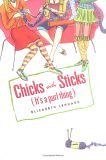 Chicks with Sticks: It's a Purl Thing by Elizabeth Lenhard is a cute book about four teenagers who find each other and friendship through knitting. It's not an earth-shattering work of literary greatness, but it's sweet and a quick read and has some nice patterns in the back for. Obviously written by someone who loves yarn a little too much (as we do).
Chicks with Sticks: It's a Purl Thing by Elizabeth Lenhard is a cute book about four teenagers who find each other and friendship through knitting. It's not an earth-shattering work of literary greatness, but it's sweet and a quick read and has some nice patterns in the back for. Obviously written by someone who loves yarn a little too much (as we do). Friday, September 15, 2006
magnifique
Suite Française by Irene Nemirovsky is worth every once of hype it got earlier this summer when it came out. For those that missed it, this is a translation of the recently discovered manuscript by Nemirovsky. A French Jew, She wrote it in the summer of 1942 and was working on it when she was deported by the occupying Nazi forces. She died shortly thereafter. It was supposed to be a 5-novel Suite and she only finished the first two-- Storm in June and Dolce before she was taken. This edition carries both novels as well as her journal entries for the summer (detailing her plans for the unwritten volumes as well as changes she wanted to make to the previous two, as they are still just drafts.) It also carries her correspondance of the time period (as she tried to get funds after her publisher was barred from paying her royalties because she was Jewish) and that of her husband and various people after she was taken as they were trying to get word on her condition.
But turning to the novels themselves... Storm in June covers the flight from Paris as the Nazi forces approach. Large columns of refugees of different social standings tell their entertwined stories as they travel south. Nemirovsky's cast of characters is huge and their stories are all the same, yet all different as the real lives of Parisian refugees were. Their terror and panic as they travel the countryside is palpable. She follows in Dolce focusing on a French village we met in Storm in June as they deal with the occupation. Some village members oppose the German forces, and some support them. I was amazed at how humanely she treats those who cooperate. Their reasons for doing so are multi-fold and deep and well thought out with no hint of rationalization.
Althought the storeis are entertwined, she avoids the obvious ways she could have intermeshed these lives further, which makes her work all the more wonderful. She paints the citizens of her adopted country (she emigrated to France from Ukraine) and its landscapes and daily life with close attention to detail and a beauty and lushness of language. These drafts of novels are more polished than several books I have read lately.
One can only hope that the success of this book will lead to more translations of her earlier work, as this is an author that deserves more recognition in the English world.
But turning to the novels themselves... Storm in June covers the flight from Paris as the Nazi forces approach. Large columns of refugees of different social standings tell their entertwined stories as they travel south. Nemirovsky's cast of characters is huge and their stories are all the same, yet all different as the real lives of Parisian refugees were. Their terror and panic as they travel the countryside is palpable. She follows in Dolce focusing on a French village we met in Storm in June as they deal with the occupation. Some village members oppose the German forces, and some support them. I was amazed at how humanely she treats those who cooperate. Their reasons for doing so are multi-fold and deep and well thought out with no hint of rationalization.
Althought the storeis are entertwined, she avoids the obvious ways she could have intermeshed these lives further, which makes her work all the more wonderful. She paints the citizens of her adopted country (she emigrated to France from Ukraine) and its landscapes and daily life with close attention to detail and a beauty and lushness of language. These drafts of novels are more polished than several books I have read lately.
One can only hope that the success of this book will lead to more translations of her earlier work, as this is an author that deserves more recognition in the English world.
Wednesday, August 16, 2006
The Life of a Cataloguer
So... we moved... and we're breaking up the bookshelves (because we no longer have one really long wall to put them all on). So... now I have to decide which books will be downstairs and which ones will be in the guest bedroom. I know all the crafty books will be in the guest bedroom but what else?!
Also, this is creating havoc with my system for entering my books into Library Thing. I think it might just be time to take all weekend and catalog my brain out.
Anyway, you don't care about that. Here are some reviews! I'm soooooooooooooooooooo far behind that I'm just going to group them into order in which I read them. We're still back in June people!
Tuck Everlasting Natalie Babbit
So...Winnie Foster runs away from home and finds the fountain of immortality and the family that drank from it and is faced with the choice to also drink from it or grow up and die...
But it's beautifully written and a classic for a reason. I can't stress enough the beautiful and wonderful command Babbit has for language and imagery. It's a book you want to sink down into on a still, hot, summer day. One of Silvey's 100 Best Books for Children.
In the Year of the Boar and Jackie Robinson Bette Bao Lord
This is the story of Shirley Temple Wong's first year in America. It's also the year that Jackie Robinson lead the Dodgers to victory. With twelve chapters (one for each month) we see as Shirley adjusts and adapts as she moves from the large family compound in China to a small apartment in Brooklyn (and how Brooklyn adjusts to her!). Funny and heart-warming... this is also one of Silvey's 100 Best, and with good reason!
Woo! June done, now July!
Because of Winn-Dixie Kate DiCamillo
Another one of the 100 Best... this is the story about the summer Opal moves to town and has no friends, but meets an ugly mutt of a dog that introduces her to the townfolk. Sweet and moving in a dog-story tyle way. Not really my cup of tea, but well-enough written that I am looking forward to reading other books by DiCamillo that have a plot that is more to my liking...
Buddha Baby Kim Wong Keltner
Sequel to The Dim Sum of All Things but even better. Funny, light Chinese-American San Fransisco chic lit with crazy escapes, a Chinese James Dean, search for ethnic identity and bi-racial relationships all mixed in. But I really missed her friend from the first book, who is sadly absent in this one. I'm totally blanking on the name. Sorry.
Esperanza Rising Pam Munoz Ryan
Esperanza lives a life of luxury in Mexico, but then her father is tragically killed and she and her mom flee to California, where they have to become field workers. A riches-to-rags story. Then her mom gets sick and Esperanza has to finally stand on her own.
This is really good and really well written, but man, I just really hated Esperanza. She was such a BITCH. But I can't fault Munoz Ryan, because I think the characters reactions and feelings were completely true to someone in her situation but I really wanted to smack her. Badly.
I then read Suite Française but I'm not going to talk about it now because it was seriously one of the best things I've read in years and desrves lots of space. Needless to say, you should read it. NOW.
Also, this is creating havoc with my system for entering my books into Library Thing. I think it might just be time to take all weekend and catalog my brain out.
Anyway, you don't care about that. Here are some reviews! I'm soooooooooooooooooooo far behind that I'm just going to group them into order in which I read them. We're still back in June people!
Tuck Everlasting Natalie Babbit
So...Winnie Foster runs away from home and finds the fountain of immortality and the family that drank from it and is faced with the choice to also drink from it or grow up and die...
But it's beautifully written and a classic for a reason. I can't stress enough the beautiful and wonderful command Babbit has for language and imagery. It's a book you want to sink down into on a still, hot, summer day. One of Silvey's 100 Best Books for Children.
In the Year of the Boar and Jackie Robinson Bette Bao Lord
This is the story of Shirley Temple Wong's first year in America. It's also the year that Jackie Robinson lead the Dodgers to victory. With twelve chapters (one for each month) we see as Shirley adjusts and adapts as she moves from the large family compound in China to a small apartment in Brooklyn (and how Brooklyn adjusts to her!). Funny and heart-warming... this is also one of Silvey's 100 Best, and with good reason!
Woo! June done, now July!
Because of Winn-Dixie Kate DiCamillo
Another one of the 100 Best... this is the story about the summer Opal moves to town and has no friends, but meets an ugly mutt of a dog that introduces her to the townfolk. Sweet and moving in a dog-story tyle way. Not really my cup of tea, but well-enough written that I am looking forward to reading other books by DiCamillo that have a plot that is more to my liking...
Buddha Baby Kim Wong Keltner
Sequel to The Dim Sum of All Things but even better. Funny, light Chinese-American San Fransisco chic lit with crazy escapes, a Chinese James Dean, search for ethnic identity and bi-racial relationships all mixed in. But I really missed her friend from the first book, who is sadly absent in this one. I'm totally blanking on the name. Sorry.
Esperanza Rising Pam Munoz Ryan
Esperanza lives a life of luxury in Mexico, but then her father is tragically killed and she and her mom flee to California, where they have to become field workers. A riches-to-rags story. Then her mom gets sick and Esperanza has to finally stand on her own.
This is really good and really well written, but man, I just really hated Esperanza. She was such a BITCH. But I can't fault Munoz Ryan, because I think the characters reactions and feelings were completely true to someone in her situation but I really wanted to smack her. Badly.
I then read Suite Française but I'm not going to talk about it now because it was seriously one of the best things I've read in years and desrves lots of space. Needless to say, you should read it. NOW.
Labels:
Adult,
Bette Bao Lord,
chicklit,
Fiction,
Juvenile,
Kate DiCamillo,
Kim Wong Keltner,
Natalie Babbit,
Pam Munoz Ryan,
YA
Friday, July 21, 2006
Post-Apocalyptic Children's Lit
Yes, such a genre exsists. I'm totally serious.
The City of Ember By Jeanne DuPrau
Doon's outburst on job assingment day disturbed Lina-- Ember couldn't be dying. But as Lina runs around the city as a messenger, she starts to see that Doon was right. Ember is dying. The blackouts come more and more often and they're lasting for longer. Supplies are running out. Peaches are now just a legend. There is very little new paper. Colored pencils are a special, rare, luxury. What if the lights never come back on? Can Doon and Lina find another way?
City of Ember is half mystery, as the kids try and piece together lost instructions that were half eaten by Lina's baby sister. But why does Ember exsist in the first place? Why do they live in world where there is only the city and nothing else? Where there isn't any light? Where everything depends on the generator? What happens with the generator fails?
Some of these questions are answered in the sequel, The People of Sparks where we learn that the world new the end was coming--through war, famine, and disease--and created a new colony underground. When they come above ground, and meet with the survivors of the great wars, will the two cultures survive? Will they get along? Can they?
I love DuPrau's use of language. She manages to perfectly capture so many small details-- such as the papery smell of tomatoes. She can evoke so many senses with just a few words--truly astounding. Ember was great, but the message of Sparks was so heavy-handed that it ruined the book. I'm interested in seeing how the prequel, The Prophet of Yonwood, ends up being.
The Big Wave Pearl S. Buck
Kino lives on a mountain by the sea in Japan while his best friend, Jiya, lives in the fishing village on the beach. Kino fears the volcano three mountains over and Jiya fears the anger of the sea. One day, the volcano and the sea battle, resulting in a giant wave that washes away the entire fishing village—and Jiya’s entire family. The main meat of this story is how Jiya learns to live again after watching the destruction of his entire family, village, and world.
Buck manages to convey so much in a very little space. She manages to span a life-time, and a full cycle of grief very potently and truly, all in a mere 64 pages. Excellent.
And, although it's not post-apocalyptic, Lois Lowry's The Giver is as dystopian as it gets... and dystopian chidlren's literature is almost as disturbing as post-apocalyptic literature (this is a visceral reaction. I really enjoyed the books I'm talking about right now, they're great books and good for children, but at first glance, the notion of such genres of children's lit exsisting give me pause. But I'm a optimistic hippie like that.)
Anyway, Jonas has been assigned to be the Reciever. He holds the memories of the community's past. A past where people were related to their families. Where there was emotion. Where there were holidays and hills and snow and sunburn... where there was pain, but also real joy... Where there was color.
But years and years ago, the people made a shift to sameness. Now there are no hills. Husbands and wives are assigned to each other and do not look on each other's nudity. When you reach puberty, you are given medication to stop "the stirrings". Children are assigned to family units. Each one has one boy and one girl. Because of genetic engineering, people look a lot a like. But it is not all happy. Anything that isn't perfect--babies that cry too much, old people, are "released".
And once Jonas discovers that releasing is just an euphanism for euthanasia... his vision of the community and what it stands for falls apart.
Powerful.
The City of Ember By Jeanne DuPrau
Doon's outburst on job assingment day disturbed Lina-- Ember couldn't be dying. But as Lina runs around the city as a messenger, she starts to see that Doon was right. Ember is dying. The blackouts come more and more often and they're lasting for longer. Supplies are running out. Peaches are now just a legend. There is very little new paper. Colored pencils are a special, rare, luxury. What if the lights never come back on? Can Doon and Lina find another way?
City of Ember is half mystery, as the kids try and piece together lost instructions that were half eaten by Lina's baby sister. But why does Ember exsist in the first place? Why do they live in world where there is only the city and nothing else? Where there isn't any light? Where everything depends on the generator? What happens with the generator fails?
Some of these questions are answered in the sequel, The People of Sparks where we learn that the world new the end was coming--through war, famine, and disease--and created a new colony underground. When they come above ground, and meet with the survivors of the great wars, will the two cultures survive? Will they get along? Can they?
I love DuPrau's use of language. She manages to perfectly capture so many small details-- such as the papery smell of tomatoes. She can evoke so many senses with just a few words--truly astounding. Ember was great, but the message of Sparks was so heavy-handed that it ruined the book. I'm interested in seeing how the prequel, The Prophet of Yonwood, ends up being.
The Big Wave Pearl S. Buck
Kino lives on a mountain by the sea in Japan while his best friend, Jiya, lives in the fishing village on the beach. Kino fears the volcano three mountains over and Jiya fears the anger of the sea. One day, the volcano and the sea battle, resulting in a giant wave that washes away the entire fishing village—and Jiya’s entire family. The main meat of this story is how Jiya learns to live again after watching the destruction of his entire family, village, and world.
Buck manages to convey so much in a very little space. She manages to span a life-time, and a full cycle of grief very potently and truly, all in a mere 64 pages. Excellent.
And, although it's not post-apocalyptic, Lois Lowry's The Giver is as dystopian as it gets... and dystopian chidlren's literature is almost as disturbing as post-apocalyptic literature (this is a visceral reaction. I really enjoyed the books I'm talking about right now, they're great books and good for children, but at first glance, the notion of such genres of children's lit exsisting give me pause. But I'm a optimistic hippie like that.)
Anyway, Jonas has been assigned to be the Reciever. He holds the memories of the community's past. A past where people were related to their families. Where there was emotion. Where there were holidays and hills and snow and sunburn... where there was pain, but also real joy... Where there was color.
But years and years ago, the people made a shift to sameness. Now there are no hills. Husbands and wives are assigned to each other and do not look on each other's nudity. When you reach puberty, you are given medication to stop "the stirrings". Children are assigned to family units. Each one has one boy and one girl. Because of genetic engineering, people look a lot a like. But it is not all happy. Anything that isn't perfect--babies that cry too much, old people, are "released".
And once Jonas discovers that releasing is just an euphanism for euthanasia... his vision of the community and what it stands for falls apart.
Powerful.
Labels:
Fiction,
Jeanne DuPrau,
Juvenile,
Lois Lowry,
Pearl S. Buck,
post-apocalyptic
Saturday, July 15, 2006
Rainy Hazy Days are made for reading. Not blogging.
Gah. So far behind. Short and Sweet it is folks! Starting with the books I read back in MAY and haven't talked about yet! (Also, I am still reading up a storm. Seriously. I have 65 books checked out right now. Not to mention the ones waiting on my bookshelf!)
A Dirty Job Christopher Moore
Oh my. This has to be the funniest thing I've read since Moore's Lamb : The Gospel According to Biff, Christ's Childhood Pal. One day, during a tragic loss, Charlie (the ultimate beta-male) discovers he's Death. Or, one of many little deaths that run around and collect souls when people pass. His toddler daughter can kill with a single word and can't keep a house pet alive until two hell hounds arrive to stay. And there are demons in the sewers trying to take over the world. HYSTERICALLY!!! Because really, there's nothing more funny than a 2 year old screaming "Kitty!" at people and watching them keel over. (Seriously, I loved this book so much that I moved it to the top of this post so it wouldn't get lost in the shuffle)
Caddy Ever After Hilary McKay
This is the latest (and maybe last?!) book in the Casson Series (others were Saffy's Angel, Indigo's Star, and Permanent Rose). The narrative of this one is a bit different as different sections are told by the four Casson family, instead of focusing on just one child. But the magic and love continue. And my own personal heartbreak, because Caddy discovers that love at first sight exsists. And it is NOT darling Michael. (Horror! I know!) Absolutely lovely and perfect.
Tales of the City and More Tales of the City by Armistad Maupin (well, I read the first in May, the second in June)
This are actually both rereads for me. I read the first three books in this series in high school and loved, loved, loved them. But I never read the next three. I checked them all out from the library and decided to start by rereading the early ones because high school was a long time ago.
These are the stories of an unlikely band of people thrown together by all living at the magical apartment building, 28 Barbury Lane in San Fransisco, plus the other people sucked into their lives. Originally serialized in a newspaper, the chapters are only a few pages long, making for nice reading. They're light, they're breezy, the characters and the trouble they find themselves in are CRAZY. (In that delightful way)
I will say though, these books don't hold the impact they once did for me. I'm told by people who were there that they do paint an extremely accurate portrait of San Fransisco in the 70s. And they are still funny and light and I will be reading the next four!
And now we're totally into the June books!
The Booktalker's Bible: How to Talk About the Books You Love to Any Audience Chapple Langemack
Ok, so this will only appeal to you if you ever have to do Book Talking (where you go and do a little spiel on a book so people will want to read it.) BUT! If you have to do booktalking, this book is GREAT and has lots of examples (seriously, my "to read" list grew a ton while reading this.) I highly recommend for teacher and librarian types.
Refugee Boy Benjamin Zephaniah
Alem is half Ethiopian, half Eritrean. No matter where he is, he's the enemy. His dad takes him on a vacation to England and then leaves in the middle of the night, with a note saying that he must seek asylum. Alem is left adrift in a cold, foreign land and has to navigate the insane system of asylum seeking and immigration. Tragic, well written and a damning (and true) portrait of British immigration.
Adrian Mole: The Cappuccino Years Sue Townsend
So, JoJo has left Adrian and gone back to Nigeria. Their son is living with Pauline. Pandora has been swept into Parliament with the New Labor landslide. And Adrain has a cooking show for offal (main market: stoned university drop-outs). HILARIOUS.
Ok, that's enough for one day. More to come! I'm still behind.
I do just want to mention that I'm currently finishing up Suite Française by Irene Nemirovsky and it is absolutly wonderful and my new favorite book. The hype doesn't even do it justice.
A Dirty Job Christopher Moore
Oh my. This has to be the funniest thing I've read since Moore's Lamb : The Gospel According to Biff, Christ's Childhood Pal. One day, during a tragic loss, Charlie (the ultimate beta-male) discovers he's Death. Or, one of many little deaths that run around and collect souls when people pass. His toddler daughter can kill with a single word and can't keep a house pet alive until two hell hounds arrive to stay. And there are demons in the sewers trying to take over the world. HYSTERICALLY!!! Because really, there's nothing more funny than a 2 year old screaming "Kitty!" at people and watching them keel over. (Seriously, I loved this book so much that I moved it to the top of this post so it wouldn't get lost in the shuffle)
Caddy Ever After Hilary McKay
This is the latest (and maybe last?!) book in the Casson Series (others were Saffy's Angel, Indigo's Star, and Permanent Rose). The narrative of this one is a bit different as different sections are told by the four Casson family, instead of focusing on just one child. But the magic and love continue. And my own personal heartbreak, because Caddy discovers that love at first sight exsists. And it is NOT darling Michael. (Horror! I know!) Absolutely lovely and perfect.
Tales of the City and More Tales of the City by Armistad Maupin (well, I read the first in May, the second in June)
This are actually both rereads for me. I read the first three books in this series in high school and loved, loved, loved them. But I never read the next three. I checked them all out from the library and decided to start by rereading the early ones because high school was a long time ago.
These are the stories of an unlikely band of people thrown together by all living at the magical apartment building, 28 Barbury Lane in San Fransisco, plus the other people sucked into their lives. Originally serialized in a newspaper, the chapters are only a few pages long, making for nice reading. They're light, they're breezy, the characters and the trouble they find themselves in are CRAZY. (In that delightful way)
I will say though, these books don't hold the impact they once did for me. I'm told by people who were there that they do paint an extremely accurate portrait of San Fransisco in the 70s. And they are still funny and light and I will be reading the next four!
And now we're totally into the June books!
The Booktalker's Bible: How to Talk About the Books You Love to Any Audience Chapple Langemack
Ok, so this will only appeal to you if you ever have to do Book Talking (where you go and do a little spiel on a book so people will want to read it.) BUT! If you have to do booktalking, this book is GREAT and has lots of examples (seriously, my "to read" list grew a ton while reading this.) I highly recommend for teacher and librarian types.
Refugee Boy Benjamin Zephaniah
Alem is half Ethiopian, half Eritrean. No matter where he is, he's the enemy. His dad takes him on a vacation to England and then leaves in the middle of the night, with a note saying that he must seek asylum. Alem is left adrift in a cold, foreign land and has to navigate the insane system of asylum seeking and immigration. Tragic, well written and a damning (and true) portrait of British immigration.
Adrian Mole: The Cappuccino Years Sue Townsend
So, JoJo has left Adrian and gone back to Nigeria. Their son is living with Pauline. Pandora has been swept into Parliament with the New Labor landslide. And Adrain has a cooking show for offal (main market: stoned university drop-outs). HILARIOUS.
Ok, that's enough for one day. More to come! I'm still behind.
I do just want to mention that I'm currently finishing up Suite Française by Irene Nemirovsky and it is absolutly wonderful and my new favorite book. The hype doesn't even do it justice.
Friday, June 23, 2006
scratch my name on your arm with a fountain pen (this means you really love me)
I try not to blog about work too much, because, you know me, the consumate professional. Or something.
But there's something I wanted to bring up. I've talked before about classics education today and have bemoaned the fact that I've never studied Dickens or Austen or Bronte.
Now, when I have a kid who asks me for a book that is way beyond their level, I gladly give it to them. I read The Mists of Avalon in 4th grade, Les Miserables in 6th. My mom told me later that I didn't understand most of the content, so no harm done except for a rather pretentious vocabulary.
Earlier this week, I had a customer come in looking for the classic Greek authors for homeschooling her 4th and 5th grader. I showed her several workings of these that we have at that age level. No, she wanted to teach them The Iliad and Oedipus Rex in translation, not a children's version. Uhhhh...
I expressed suprise at such difficult material. She said she wanted them to reach a little. I mean, I read The Illiad in 8th grade, and I was reaching. But she was all on her homeschool kick and how they're better than average and how I wasn't homeschooled so blah blah. I wanted to smack her. Sure, I went to public school, but I grew up in Lake Woebegone, so whatever.
But I showed her where everything was and she picked up a copy of The Brothers Karamazov and asked me how to pronounce Doestoevsky. Riiiiiiiiiiight. She then told me that he was on her forgotten list of Greek guys she wanted to teach. I told her he was Russian.
But beyond that, lets say these kids do have a reading level of that age. I'm not saying they shouldn't read it, but they shouldn't be taught it. It's one thing to read and understand the content to the best of our ability, but do you really want to give a 4th grader a lesson on the Oedipus complex? About Smedrikov's parental situation? About patricide? And why Ivan drinks so much vodka? Seriously?
There is a difference between reading level and content level. Let kids be kids. Damn.
Anyway... so, I finally bought Meat Is Murder by The Smiths, because I am in love with "Rusholme Ruffians". Maybe because I've seen a Platt Field's fun fair so I can feel like I understand it on a deeper level or someother crap like that, but it's a good song. I've been listening to the disc non-stop for the last few days. Also, because I am the world's biggest idiot, I didn't know that "How Soon is Now?" is a Smiths song. Or didn't realize what song it was. Because it came on and I was like "Wha?"
Anyway.
In honor of the last night of the fair, here are some books that talk about The Smiths.
Charmed Thirds Megan McCafferty
Our Not-so Darling Jessica is off to college. There's lots of touching stuff with her sister and her parents and Marcus and blah blah and if you liked the others, you'll like this one.
But what I really liked about this one is that it gave a really accurate picture of college life. There are a bunch of pissy reviews on Amazon of people who are obviously not in college about how Jessica changed to much and what happened and why didn't she stay in touch with blah blah blah... but that's what happens when you go to college. You become a different person. You lose touch with the kids from high school. You become an adult (gasp! I know!)
I also like the little details thrown in of Brita-filtered Vladimir and and Ali G-style "Respek". And even the talk about Facebook. Except McCafferty calls it THE Facebook. Ha.
Most of all, I loved that Jessica discovered early on that college is college and the college experience isn't unique to your university. The mind-altering life changing thoughts and experiences? Every other college kid is having them too. I liked that she realized this early. I liked how it crushed her. Because that moment was just SO TRUE. And so rare in literature. Especially when the character is at the author's alma mater, which is the case here.
I also loved this bit of irony
He's one of those shaggy-haired sideburned emos who owes a great debt to Conor Oberst as the champion for man-children with ink on their hands and poetry in their heavy, heavy hearts.
Not only hilarious and true, but coming from the world's biggest Smiths and Morrisey fan. I mean, Morrissey has to be the FATHER of emo, and I don't think Jess realizes it.
Also, is it just me, or do YA authors give their teen characters a retro taste in music back the era that they were high schoolers in, so the characters can feel all deep and meaningful about the same music that the author did instead of this crap that these young whippersnappers are listening to today?
King Dork Frank Portman
I read this because Michael at Bookslut won't shut up about it.
And with good reason. An excellent anti-Catcher, pro rock-and-roll novel that is hilarious.
It also contains such passages as this:
I should mention that Catcher in the Rye is this book from the fifties. It is every teacher's favorite book. The main guy is a kind of misfit kid superhero neamed Holden Caulfield. For teacher he is the ultimate guy, a real dream boat. They love him to pieces. They all want to have sex with him and with the book's author, too, and they'd probably even try to do it with the book itself if they could figure out a way to go about it. It changed their lives when they were young. As kids, they carried it with them everywhere they went. They solemnly resolved that, when they grew up, they would dedicate their lives to spreading The Word.
It's kind of like a cult.
His riffs on the drama kids (at his school faux-hippies, at the other high school, faux-mods) high school pecking order and the endless litany of band names he comes up with. Plus, sex, drugs and murder. WHAT MORE COULD YOU WANT?!
Even if the glossary does define The Smiths as "Music for sad people"
There's also this great bit about this other band that's mainly doing covers of the Smiths, the Cure, and Joy Division (whom I am also in love with)
The irony was that the singer was Dennis Thela, who was among the most sadistic alpha psychos the normal world had to offer. In other words, he was a major player in the nation of perpetrators. He and his evil super bitch girlfriend had been responsible for half of the suicide attempts, nervous breakdowns and eating disorders in the greater Bay Area. It's guys like Dennis Thela who made the Smiths, the Cure and Joy Division necessary in the first place. I had thought normal people and that sort of music were mutually exclusive, but I guess I was wrong. It's a funny world.
How can you not love that?!
And, even though it never mentions The Smiths,
The Realm of Possibility by David Levithan
DOES talk about The Catcher in the Rye.
This is a collection 20 poems, each told by another high school student. They don't focus around the same event or even the same period in time. Just 20 takes on life in high school, with some inter-related stories.
Including one great poem from a guy who's going crazy because his girlfriend is in love with Holden Caufield. HA HA HA.
But it's great, because everything Levithan writes is great.
But there's something I wanted to bring up. I've talked before about classics education today and have bemoaned the fact that I've never studied Dickens or Austen or Bronte.
Now, when I have a kid who asks me for a book that is way beyond their level, I gladly give it to them. I read The Mists of Avalon in 4th grade, Les Miserables in 6th. My mom told me later that I didn't understand most of the content, so no harm done except for a rather pretentious vocabulary.
Earlier this week, I had a customer come in looking for the classic Greek authors for homeschooling her 4th and 5th grader. I showed her several workings of these that we have at that age level. No, she wanted to teach them The Iliad and Oedipus Rex in translation, not a children's version. Uhhhh...
I expressed suprise at such difficult material. She said she wanted them to reach a little. I mean, I read The Illiad in 8th grade, and I was reaching. But she was all on her homeschool kick and how they're better than average and how I wasn't homeschooled so blah blah. I wanted to smack her. Sure, I went to public school, but I grew up in Lake Woebegone, so whatever.
But I showed her where everything was and she picked up a copy of The Brothers Karamazov and asked me how to pronounce Doestoevsky. Riiiiiiiiiiight. She then told me that he was on her forgotten list of Greek guys she wanted to teach. I told her he was Russian.
But beyond that, lets say these kids do have a reading level of that age. I'm not saying they shouldn't read it, but they shouldn't be taught it. It's one thing to read and understand the content to the best of our ability, but do you really want to give a 4th grader a lesson on the Oedipus complex? About Smedrikov's parental situation? About patricide? And why Ivan drinks so much vodka? Seriously?
There is a difference between reading level and content level. Let kids be kids. Damn.
Anyway... so, I finally bought Meat Is Murder by The Smiths, because I am in love with "Rusholme Ruffians". Maybe because I've seen a Platt Field's fun fair so I can feel like I understand it on a deeper level or someother crap like that, but it's a good song. I've been listening to the disc non-stop for the last few days. Also, because I am the world's biggest idiot, I didn't know that "How Soon is Now?" is a Smiths song. Or didn't realize what song it was. Because it came on and I was like "Wha?"
Anyway.
In honor of the last night of the fair, here are some books that talk about The Smiths.
Charmed Thirds Megan McCafferty
Our Not-so Darling Jessica is off to college. There's lots of touching stuff with her sister and her parents and Marcus and blah blah and if you liked the others, you'll like this one.
But what I really liked about this one is that it gave a really accurate picture of college life. There are a bunch of pissy reviews on Amazon of people who are obviously not in college about how Jessica changed to much and what happened and why didn't she stay in touch with blah blah blah... but that's what happens when you go to college. You become a different person. You lose touch with the kids from high school. You become an adult (gasp! I know!)
I also like the little details thrown in of Brita-filtered Vladimir and and Ali G-style "Respek". And even the talk about Facebook. Except McCafferty calls it THE Facebook. Ha.
Most of all, I loved that Jessica discovered early on that college is college and the college experience isn't unique to your university. The mind-altering life changing thoughts and experiences? Every other college kid is having them too. I liked that she realized this early. I liked how it crushed her. Because that moment was just SO TRUE. And so rare in literature. Especially when the character is at the author's alma mater, which is the case here.
I also loved this bit of irony
He's one of those shaggy-haired sideburned emos who owes a great debt to Conor Oberst as the champion for man-children with ink on their hands and poetry in their heavy, heavy hearts.
Not only hilarious and true, but coming from the world's biggest Smiths and Morrisey fan. I mean, Morrissey has to be the FATHER of emo, and I don't think Jess realizes it.
Also, is it just me, or do YA authors give their teen characters a retro taste in music back the era that they were high schoolers in, so the characters can feel all deep and meaningful about the same music that the author did instead of this crap that these young whippersnappers are listening to today?
King Dork Frank Portman
I read this because Michael at Bookslut won't shut up about it.
And with good reason. An excellent anti-Catcher, pro rock-and-roll novel that is hilarious.
It also contains such passages as this:
I should mention that Catcher in the Rye is this book from the fifties. It is every teacher's favorite book. The main guy is a kind of misfit kid superhero neamed Holden Caulfield. For teacher he is the ultimate guy, a real dream boat. They love him to pieces. They all want to have sex with him and with the book's author, too, and they'd probably even try to do it with the book itself if they could figure out a way to go about it. It changed their lives when they were young. As kids, they carried it with them everywhere they went. They solemnly resolved that, when they grew up, they would dedicate their lives to spreading The Word.
It's kind of like a cult.
His riffs on the drama kids (at his school faux-hippies, at the other high school, faux-mods) high school pecking order and the endless litany of band names he comes up with. Plus, sex, drugs and murder. WHAT MORE COULD YOU WANT?!
Even if the glossary does define The Smiths as "Music for sad people"
There's also this great bit about this other band that's mainly doing covers of the Smiths, the Cure, and Joy Division (whom I am also in love with)
The irony was that the singer was Dennis Thela, who was among the most sadistic alpha psychos the normal world had to offer. In other words, he was a major player in the nation of perpetrators. He and his evil super bitch girlfriend had been responsible for half of the suicide attempts, nervous breakdowns and eating disorders in the greater Bay Area. It's guys like Dennis Thela who made the Smiths, the Cure and Joy Division necessary in the first place. I had thought normal people and that sort of music were mutually exclusive, but I guess I was wrong. It's a funny world.
How can you not love that?!
And, even though it never mentions The Smiths,
The Realm of Possibility by David Levithan
DOES talk about The Catcher in the Rye.
This is a collection 20 poems, each told by another high school student. They don't focus around the same event or even the same period in time. Just 20 takes on life in high school, with some inter-related stories.
Including one great poem from a guy who's going crazy because his girlfriend is in love with Holden Caufield. HA HA HA.
But it's great, because everything Levithan writes is great.
Labels:
david levithan,
Fiction,
frank portman,
jessica darling,
megan mccafferty,
pet peeves,
smiths,
YA
Saturday, June 17, 2006
Catching Up-- Fairy Tales
Well... I've been reading a whole heck of a lot and work's been pretty busy lately. So, here's to trying to catch up a bit!!!! I still haven't blogged everything I read in May, let alone so far in June! Plus, I have pages and pages of banned books to tell you about (unfortuneately...)
Anyway... here we go!
The Goose Girl Shannon Hale
You remember how much I loved and adored Princess Academy? This is just as good, if not better. Written for a slightly older audience than Academy, Goose Girl retells the not-as-well-known Grimm fairy tale. Princess Ani of Kildenree is being married off to a far-off prince as part of a diplomatic deal between the two countries. One her way, her handmaid and a faction of her escort overthrow her, instating the handmaid as the princess and forcing Ani to run for her life in the woods. Eventually, she reaches the new kingdom, but is forced into hiding. She must disguise her distinctive blond hair in a country of brunettes and change her name to Isi. She gets a job tending the king's geese as she tries and finds a way to regain her rightful position.
At the same time, she see's the injustice in this new land. She passes herself off as one of the people from the forest, but sees how the forest people are never accepted by the city people and not allowed to become full citizens. Of course, her traitorous guards know she's around and are looking for her...
In the end, in addition to an excellent fairy tale, there are also deep lessons about belonging, justice, inner strength, friendship, and discovering who you are.
More than this though, Hale's prose and her sense of place and location make this book a sheer delight and quickly making her one of my favorite authors.
Enna Burning Shannon Hale
This is a companion book to Goose Girl and is an originial tale, not a retelling. In this book, Ani's friend Enna takes the lead war as Bayern is faced with an invading army. Ani's gift of wind-speak is grown out of control to the point where it overwhelms her. Enna has learned the secret of fire-speak and uses her gift in battle but must live with the consequences of burning people alive. Her gift is also raging out of control with the war far from over, she, and Bayern need help.
This is a powerful followup to Goose Girl and perhaps my favorite of Hale's three works so far. I highly recommend.
Fables Vol. 1: Legends in Exile Bill Willingham
Ooooo.... a graphic novel series has finally sucked me in, big time. Here is an underground community of Fable-characters who are exiled in modern day New York. Back when it was still New Amsterdam, they fled after their various kingdoms and worlds were taken over by the unknown Adversary. Fabletown is led by Mayor King Cole, but everyone knows that Deputy Mayor Snow White is the real power behind the throne, with sheriff Bigby (Big Bad Wolf) keeping order. In this first book, which is the first 5 comic books bound into one collection,Snow's sister, Rose Red is missing, possibly murdered... fun stuff!
Fables Vol. 2: Animal Farm
Rose is paying off her community service debt up at The Farm, where Fabletowns non-human residents live. When Rose gets there, she finds herself embroiled in a communist plot to take over the farm and eventually return to the homelands. With Goldilocks as the communist revolutionary, followed in Orwellian fashion by the three little pigs, there is a battle on...
Fables Vol. 3: Storybook Love
This is great, because we have some stand-alone stories in addition to adding on to the story arc of the previous two books. There's a Civil War Era tale of Jack's, plus the history of how the Liliputians escaped and the origins of their current coming-of-age ritual of trying to steal a piece of magic barley-corn. There is also a non-story arc story in the modern fabletown community where a journalist is onto the Fables... but misreads the evidence. After confronting Bigby with the news that he knows they're all vampires, they come up with a plot involving Sleeping Beauty's special talents...
In the title story, things get down to business as we discover whose side Bluebeard is really on, as well as the return of previous villians. Bigby and Snow are targeted and forced into hiding and the end reveals a big secret that has you *dying* for the next installment!
Fables Vol. 4: March of the Wooden Soldiers
This starts with Boy Blue's retelling of the last battle of the Homelands, descibing the battle, and the survivor's guilt faced by those on the last ship that made it to the New York.
This also sets up the main story of the return on Red Riding Hood, who wasn't on the last ship. But is she who she says she is? There's been goblin sightings and even worse, the portal has been reopened and the Advesary's forces have found them. Fabletown is once again battling for their very exsistance, but this time in the heart of fundy New York.
Fables Vol. 5: The Mean Seasons
The early tales in this volume see Bigby's war stories and Cinderella's true nature.
In the main story, we follow a year in the life of Fabletown. Charming wins the election and there's a new adminstration. Beauty and the Beast have a hard time learning the ropes and Charming sees that not all promises can be kept. Snow gives birth relocates to the farm with Rose. Bigby dissappears and the North Wind shows up to give some pointers to his grandchildren. This volume doesn't see the amount of action as the previous ones, but it packs a true emotional punch. Very well done and probably my favorite.
Fables Vol. 6: Homelands
We start with a one-off on where Jack went to, which introduces his own new spin-off series.
In the mean time, we see Fabletown, where Blue has run off with Pinnochio and gone back to the homelands, ready to face down the advesary, whom we finally see and discover. We are also told that so far only the European worlds were taken, but the adversary is expanding, and the Asian and African worlds are set to fall as well...
Which has me really really excited for...Fables: Vol. 7 Arabian Nights (and Days) which comes out a week from today. I can't decide whether to buy it or not, because I've read all the others in the library, but they haven't even ordered it yet, so who knows when we're getting it?!
The Sisters Grimm : The Problem Child Michael Buckley
In this third installment, there is a Jabberwocky lose in Ferryport. We also have the return of a long lost relative and Granny Grimm's reluctance to take on a case, which has Sabrina and Daphne worried. There is an election for Ferryport mayor and we meet the Little Mermaid, the Blue Fairy and Baba Yaga. Puck is gravely injured and it looks like the only way to save him and deal with the Jaberwocky is the vorpal blade... which was destroyed. Sabrina also learns how addictive magic can be and the high price one pays for using it. Very good! I can't wait for the next one!
Anyway... here we go!
The Goose Girl Shannon Hale
You remember how much I loved and adored Princess Academy? This is just as good, if not better. Written for a slightly older audience than Academy, Goose Girl retells the not-as-well-known Grimm fairy tale. Princess Ani of Kildenree is being married off to a far-off prince as part of a diplomatic deal between the two countries. One her way, her handmaid and a faction of her escort overthrow her, instating the handmaid as the princess and forcing Ani to run for her life in the woods. Eventually, she reaches the new kingdom, but is forced into hiding. She must disguise her distinctive blond hair in a country of brunettes and change her name to Isi. She gets a job tending the king's geese as she tries and finds a way to regain her rightful position.
At the same time, she see's the injustice in this new land. She passes herself off as one of the people from the forest, but sees how the forest people are never accepted by the city people and not allowed to become full citizens. Of course, her traitorous guards know she's around and are looking for her...
In the end, in addition to an excellent fairy tale, there are also deep lessons about belonging, justice, inner strength, friendship, and discovering who you are.
More than this though, Hale's prose and her sense of place and location make this book a sheer delight and quickly making her one of my favorite authors.
Enna Burning Shannon Hale
This is a companion book to Goose Girl and is an originial tale, not a retelling. In this book, Ani's friend Enna takes the lead war as Bayern is faced with an invading army. Ani's gift of wind-speak is grown out of control to the point where it overwhelms her. Enna has learned the secret of fire-speak and uses her gift in battle but must live with the consequences of burning people alive. Her gift is also raging out of control with the war far from over, she, and Bayern need help.
This is a powerful followup to Goose Girl and perhaps my favorite of Hale's three works so far. I highly recommend.
Fables Vol. 1: Legends in Exile Bill Willingham
Ooooo.... a graphic novel series has finally sucked me in, big time. Here is an underground community of Fable-characters who are exiled in modern day New York. Back when it was still New Amsterdam, they fled after their various kingdoms and worlds were taken over by the unknown Adversary. Fabletown is led by Mayor King Cole, but everyone knows that Deputy Mayor Snow White is the real power behind the throne, with sheriff Bigby (Big Bad Wolf) keeping order. In this first book, which is the first 5 comic books bound into one collection,Snow's sister, Rose Red is missing, possibly murdered... fun stuff!
Fables Vol. 2: Animal Farm
Rose is paying off her community service debt up at The Farm, where Fabletowns non-human residents live. When Rose gets there, she finds herself embroiled in a communist plot to take over the farm and eventually return to the homelands. With Goldilocks as the communist revolutionary, followed in Orwellian fashion by the three little pigs, there is a battle on...
Fables Vol. 3: Storybook Love
This is great, because we have some stand-alone stories in addition to adding on to the story arc of the previous two books. There's a Civil War Era tale of Jack's, plus the history of how the Liliputians escaped and the origins of their current coming-of-age ritual of trying to steal a piece of magic barley-corn. There is also a non-story arc story in the modern fabletown community where a journalist is onto the Fables... but misreads the evidence. After confronting Bigby with the news that he knows they're all vampires, they come up with a plot involving Sleeping Beauty's special talents...
In the title story, things get down to business as we discover whose side Bluebeard is really on, as well as the return of previous villians. Bigby and Snow are targeted and forced into hiding and the end reveals a big secret that has you *dying* for the next installment!
Fables Vol. 4: March of the Wooden Soldiers
This starts with Boy Blue's retelling of the last battle of the Homelands, descibing the battle, and the survivor's guilt faced by those on the last ship that made it to the New York.
This also sets up the main story of the return on Red Riding Hood, who wasn't on the last ship. But is she who she says she is? There's been goblin sightings and even worse, the portal has been reopened and the Advesary's forces have found them. Fabletown is once again battling for their very exsistance, but this time in the heart of fundy New York.
Fables Vol. 5: The Mean Seasons
The early tales in this volume see Bigby's war stories and Cinderella's true nature.
In the main story, we follow a year in the life of Fabletown. Charming wins the election and there's a new adminstration. Beauty and the Beast have a hard time learning the ropes and Charming sees that not all promises can be kept. Snow gives birth relocates to the farm with Rose. Bigby dissappears and the North Wind shows up to give some pointers to his grandchildren. This volume doesn't see the amount of action as the previous ones, but it packs a true emotional punch. Very well done and probably my favorite.
Fables Vol. 6: Homelands
We start with a one-off on where Jack went to, which introduces his own new spin-off series.
In the mean time, we see Fabletown, where Blue has run off with Pinnochio and gone back to the homelands, ready to face down the advesary, whom we finally see and discover. We are also told that so far only the European worlds were taken, but the adversary is expanding, and the Asian and African worlds are set to fall as well...
Which has me really really excited for...Fables: Vol. 7 Arabian Nights (and Days) which comes out a week from today. I can't decide whether to buy it or not, because I've read all the others in the library, but they haven't even ordered it yet, so who knows when we're getting it?!
The Sisters Grimm : The Problem Child Michael Buckley
In this third installment, there is a Jabberwocky lose in Ferryport. We also have the return of a long lost relative and Granny Grimm's reluctance to take on a case, which has Sabrina and Daphne worried. There is an election for Ferryport mayor and we meet the Little Mermaid, the Blue Fairy and Baba Yaga. Puck is gravely injured and it looks like the only way to save him and deal with the Jaberwocky is the vorpal blade... which was destroyed. Sabrina also learns how addictive magic can be and the high price one pays for using it. Very good! I can't wait for the next one!
Labels:
Adult,
Bayern,
Bill Willingham,
Fables,
Fairy Tales,
favorites,
Fiction,
Graphic Novel,
Juvenile,
Michael Buckley,
Shannon Hale,
Sisters Grimm,
YA
Subscribe to:
Comments (Atom)

